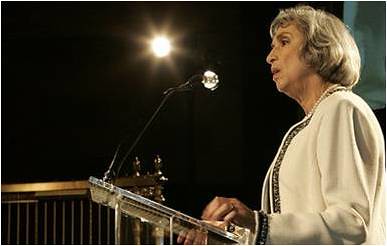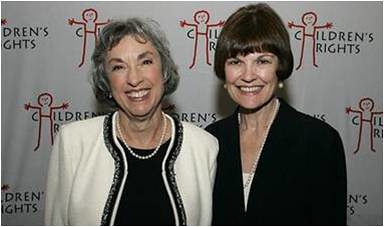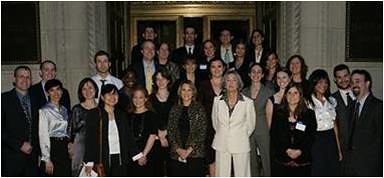
One woman who does look, act decisively, and manages to avoid the road blocks is the founder and executive director of Children’s Rights, attorney Marcia Robinson Lowry.
I know first-hand how tragic the foster care system in America can be.
New York, N.Y. — America’s various child welfare systems are so large and complex — and often so out of control — that even people who are inclined to do something don’t know where to begin. Those who do advocate for changes often find road blocks at every turn when trying to implement much needed reforms.
One problem with the crisis that is foster care in America is that the challenges are usually so horrific most Americans cannot bear to look at it – and thus typically do not respond.

One woman who does look, act decisively, and manages to avoid the road blocks is the founder and executive director of Children’s Rights, attorney Marcia Robinson Lowry.
Marcia and her team at Children’s Rights have pioneered a body of law that protects the rights of children in the custody of state-run child welfare systems, such as Oklahoma, Michigan, New Jersey, Tennessee – and New York.
Using federal and state laws — and the court orders they have secured — these lawyers are able to impose a kind of accountability on foster-care systems they often lack.
What can be done to help protect children in foster care across America when the over-burdened, under-funded system fails?
The answer, on a state-by-state basis, is almost always provided through litigation. Marcia and her team build the case for the federal court‘s intervention in a failing child welfare system – and then seek federal court orders mandating change.
Such court orders — settlement agreements — provide a detailed road map on how to improve foster care, with specific benchmarks allowing for its management and success.
To achieve this, Marcia’s team works with local advocates after these local groups have exhausted their options and have come to the realization that they cannot do it without influence — and support — from a nationally recognized organization.

New York City-based Children’s Rights then partners with local counsel to identify problems in failing systems and develop ways to fix them.
The group also works closely with local and national experts on child welfare issues across the U.S.
Children’s Rights is now working with ten active cases — two pre-judgment and eight in which court-enforceable settlements or judgments are being monitored and enforced. The two pre-judgment states are Oklahoma and Rhode Island.
In eight states the organization has entered the monitoring or watch-dog phase.
Each case represents thousands of children in foster care.
Ten thousand in b, with another 18,000 in Michigan, 11,000 in New Jersey, and as many as 9,000 in Tennessee. New York and California lead in the number of foster children in the U.S.
Begun as a committee of the New York Civil Liberties Union, later became part of the ACLU, Children’s Rights stood on its own in 1995.
One reason for the demise of our foster-care system is that foster children, as a class, are almost completely without power. They are falling through the cracks of this antiquated American system. Marcia and her organization are there to represent these children and are having success at shoring up some of the holes.

“The problem is that the system lacks accountability,” says Marcia in a recent interview. “Systems tend to be neglected and states must be forced to provide adequate care. So we use the courts to force them.”
In effect, Marcia and her dedicated team shine a light on the darkest recesses of foster care, forcing governments to improve such care with the beam they provide.
Marcia notes that abuse and neglect in foster care is easy to illustrate and the media focuses on its failings regularly. “The more difficult issue is how to address systemic failure and move towards positive outcomes,” she says.
Foster care is supposed to be temporary.
Currently 500,000 children in the United States live in foster care. The majority of kids who enter foster care are eventually reunified with their parents, and others get adopted out of the system.

with Children’s Rights paralegal Mavis Asiedu-Frimpong.
These are the ideal outcomes — children who regain the stability of permanent families — ideally as quickly as possible.
For the remaining children, the outlook is grim. About 25,000 young people age out of child welfare systems nationwide every year, representing a lost generation.
The longer kids stay in foster care — and especially if they age out without permanent families or adequate resources for making the transition into independent adult life — the bleaker their outlook becomes.
The costs associated with the failure of foster care cannot be understated.
Through negative early experiences, former foster children have a disproportionate rate of homelessness, sickness, drug addiction, and encounters with the criminal justice system.
It would be far cheaper for taxpayers to insist on proper foster care systems to allow our children to have normal, healthy, and stable lives. The U.S. spends $104 billion each year responding to abuse and neglect.
This figure includes both the money that the U.S. spends annually on its child welfare system (about $24 billion) and the costs associated with the longer-term consequences of providing inadequate child welfare services.
ADVERTISEMENT

Children’s Rights is working hard to protect these children across the United States. Their goal is to give kids a chance to grow up healthy and safe — in permanent homes with real families – and to have a childhood again.
The problems that Children’s Rights tackles are extremely large and complicated. Figuring out how to do something about them and bring about meaningful, lasting change for the children is the biggest challenge.
I know first-hand how tragic the foster care system in America can be.
My family hosted three little Puerto Rican girls who came to us from the hospital where two of them had been admitted with suspected sexual abuse. After nine months of loving them and doing all we could for them, they were awarded back to the father and we never saw them again.
I was devastated to see the little girls who stayed with my family go back. As a foster father, I was not allowed to communicate with them after they left our family.
Marcia Robinson Lowry and her team are there for these three girls – for all the children living in and out of foster care in the U.S. I rest easier knowing that Marcia and the staff of Children’s Rights continue to work unceasingly so that all children in America’s foster care are safe.
Children’s Rights: Protecting Foster Care in the U.S. Originally published in Daily Kos, Aug. 10, 2009. Edited by Sharon Alleman.